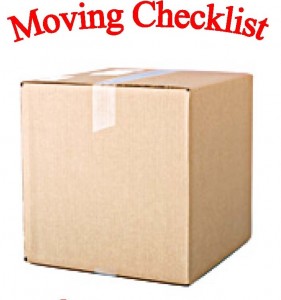
by admin | Dec 18, 2012 | Moving
 Moving Checklist
Moving Checklist
Use this handy checklist to plan and organize your moving activities. Print this page and post it on your fridge for easy reference. Remember to save your receipts. Some moving expenses may be tax deductible.
One month before
- Start a moving expense book.
- Ask for references from at least two moving companies and get written estimates. Feel free to call me for references to companies my clients have used in the past. Make sure the movers know all the items which are to be included. Do not include jewellery or other small valuables. Ask for a copy of the mover’s insurance and compare it with your existing coverage.
- Get a written commitment from the moving company that specifies the date of the move and arrival.
- Contact the provincial health authorities for the province you are moving out of and the one you are moving into. If moving within the same province notify them of your change of address.
- Resign from any clubs or organizations that are not active in your new community.
- Cancel newspaper and magazine subscriptions or change address.
- Contact your bank to arrange the transfer of accounts and loans if required.
- Order cheques with new address.
- Register your change of address with the post office, and obtain a supply of change of address cards.
- Begin mailing your change of address cards. Keep a list of cards sent. Don’t forget to notify all credit card companies.
- Gather all important documents including your pets’.
Two weeks before
- Clean out club and school lockers.
- Arrange for the change over of utilities.
- Take measurements of the new house. Make a floor plan and decide where everything will go. Don’t guess.
- Book freight elevator if you are moving out of an apartment.
- Start packing. Number and mark contents of boxes. Keep an inventory list and make two copies for each box. Keep one with your inventory list and put the other inside each box. Seal boxes.
- Return all borrowed items and collect what you’ve loaned.
One week before
- List all of the items you want to take with you personally. Include all valuable items which should not be entrusted to movers.
- Dismantle and/or fasten anything that requires it.
- Prepare a list of everything else that is left.
- Confirm the booking for the freight elevator.
- Confirm the booking for the moving company.
- Defrost and air-dry the deep freezer.
Two days before
- The last day to pack! Double check location of valuables and important papers.
- If you are taking the appliances, remember to disconnect, defrost, and air-dry the fridge and freezer.
- Do your last laundry. Disconnect and drain the washing machine if you are taking it with you.
- Protect delicate furniture with a thick coat of wax.
One day before
- Show packers around the house and ensure they understand all of your instructions.
- Gather together all keys (don’t forget garage, shed, and mail keys).
- If you have a security system consider changing the code to something simple like 12345 so you can use the old code at your new house.
- Pack all of the items you will take personally. Mark them “do not load – for car” or better, get them out of the house before the movers come in.
Moving day
- Plastic sheets will minimize dirt in the house.
- Show the packers around the house again.
- Do a final check for forgotten items.
- Check inventory for the number of boxes. Break it down room-by-room.
- Check mover’s bill of lading against your inventory.
- Give one key to the lawyer and leave all spare keys and security code inside the house unless otherwise arranged.
Moving in
- Get to the house before the movers. Arrange to take milk, bread, coffee, tea, etc. with you. It will be a long day.
- Lay down plastic sheets to minimize dirt in the house.
- Find your floor plan and give copies to the movers. When your goods arrive look at each item carefully as it is put in place and check off your inventory.
- Note any damage. You won’t be able to check goods which have not been unpacked so above your signature on the Bill of lading write: “subject to loss or hidden damage”.
- Verify that the utilities have been turned on.
- Hang up curtains if possible.
- First priorities will be the children’s rooms, TV or radio, and basic kitchen.

by admin | Apr 3, 2012 | Moving, Selling
Do your homework when choosing a mover

For some consumers, the most daunting aspect of the buying or selling process is the move itself.
Moving is not only labour-intensive, but it can also unleash a range of emotions at a difficult time. If the catalyst for the move is a family death, divorce or other major lifestyle change, a bad moving experience can rub salt in the wound, aggravating an already challenging situation.
Many resources are available to determine whether a mover is reputable. The Canadian Association of Movers (CAM), the Better Business Bureau, and any of the major national van lines (such as Allied, Atlas, Mayflower, North American or United) are all good sources. Also check out the Consumer Beware page through the Ontario Ministry of Consumer Services for movers to avoid.
One of the best tips is to place more weight on reputation than price, says John Levi, president of CAM. With about 350 members across the country, CAM represents Canada’s largest moving companies, many small to mid-sized movers, national van lines, suppliers and many international movers. It also works with government agencies to represent member issues and with consumers to provide referrals and assist with complaints.
“Many people don’t realize that their prime concern should be a having a good moving experience, not getting the cheapest price,” says Levi, who has been with CAM for 16 years.
“The lowest quoted price does not actually guarantee the lowest cost or a good-quality job, he advises.
Consider the value of your possessions as well as the potential cost of loss, damage, tardiness or claims, he says. All of those factors should be weighed to determine the move’s total price tag, and doing some homework before selecting a mover is well worth the time.
Because the moving industry is largely unregulated, Levi warns that choosing a reputable mover is vital in avoiding problems. His organization receives about 150 complaints a year about movers. The most common complaints pertain to overcharging, lateness, damage or loss, but issues also arise with inexperienced crews, poor communication, and failed promises.
To join CAM, a mover must be in business for more than a year, be reputable, and undergo a due diligence and verification process. The association checks out companies through the Better Business Bureau and asks other members to offer a fair opinion on potential members.
Loss or damage claims can end up being drawn out for years, says Levi. Consumers who take steps to do some preliminary research usually avoid claims, he adds.
Many problems are preventable. A good mover should be prepared to answer questions and provide clear expectations about the move for the individual or family. Consumers can spare themselves grief simply by asking potential movers questions such as:
What is your experience with moves like mine? How experienced is your crew? What is the bottom-line price? What is the not-to-exceed price, including all charges and taxes? What happens if loss or damages occur, and how will we be protected?
The most important step, often overlooked, is getting an in-home estimate. “Consumers can get sweet-talked over the phone by a company that claims it can do the job,” says Levi. “Unfortunately, that’s an invitation to disaster. If movers are willing to give you an estimate by phone, don’t hire them. If they can’t see your place or belongings, they have no idea how the move will go.”
An experienced mover will visit the consumer at home and examine furnishings and possessions, give a more reliable estimate, and outline difficulties that might occur during the move, he adds.
Remind your clients that damages sometimes can’t be helped, adds Levi. “There isn’t a mover around who hasn’t scratched, nicked or lost something – it happens,” says Levi. “Moving big objects through small openings means these things sometimes occur, but the crux of the matter is how the mover deals with the issue. A good mover gets the repair done quickly or pays the consumer for loss or damage if the claim is valid.”
Written estimates are vital, he adds. “Make sure that you get the company’s promises in writing,” warns Levi. “If they won’t put it in writing, don’t move with them. It’s as simple as that.”
Sharing these insights (and the tips below) with your clients before they pick a mover can make a world of difference to the outcome. It’s an extra step with the best possible reward – a happy ending.
Do research when choosing a moverJohn Levi, president of the Canadian Association of Movers, says these steps will help consumers to have a positive moving experience.
positive moving experience.
Pick three – Choose at least three companies and then check them out. Ask questions and check their reputation through available resources (see below) before settling on one.
Match them to the job – Choose a mover with the resources and crew to suit your situation. A large family move across the country and a one-bedroom condo move across town are completely different. Verify the company’s capabilities with CAM, or you may end up paying more than you thought — or learning that your mover can’t do the job and has handed it off to someone else.
Invite them over – Refuse to accept an estimate delivered by phone, fax, text or email from a mover who has not assessed the space in person. An on-site estimate is essential.
Get it in writing – Get every promise made in the moving estimate in writing, along with dates of the move and specifics on what will and won’t be moved, and who will be doing the packing. If you promise to de-clutter and pack, you must follow through or else extra charges may be added.
Book well in advance – After you’ve chosen a reputable company, ensure that the mover has lots of time to meet your expectations.
Schedule with care – Avoid booking a move the same day as a property closing or a popular moving date. Closing dates have their own problems. There may be a deadline to vacate on one side of the move, while keys or titles are not ready on the other. Such delays can mean movers sit and wait at a site, creating extra costs and stress. Avoid the first and last days of the summer months like the plague. These are a mover’s busiest times, and steering clear of those dates will boost your chances of getting an experienced crew.
Be realistic – Damage and loss can happen, although good movers will do their best to prevent or minimize them. Ask questions about company policies on loss and damage and discuss concerns about particular items with them.
For more information – Before hiring or recommending a mover, you can contact the following organizations:
Source: Edge News Letter




 positive moving experience.
positive moving experience.